"I Found Out I Was Sick a Week Before Giving Birth": Hagit Ben Ezra Gave Birth Amid the Coronavirus
While in an advanced stage of pregnancy, Hagit Ben Ezra discovered she, her husband, and most of her children had contracted the coronavirus. From that point, she began an emotional journey filled with joy and challenges, despite the police complaint filed against her and a series of obstacles she faced.
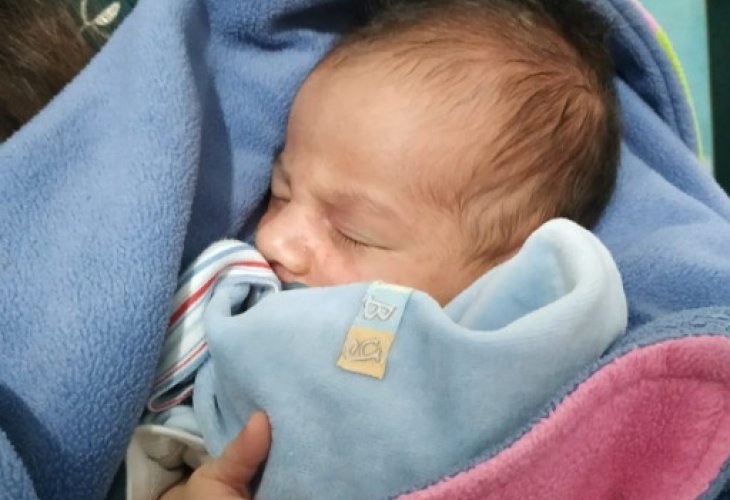
"If every birth is challenging, giving birth on the eve of Passover is undoubtedly more challenging, and giving birth when the mother and her family are sick with the coronavirus is even more so; that's exactly what happened to me," says Hagit Ben Ezra, 40, from Nof Hagalil, whose story touched thousands.
In a conversation shortly after her newborn son entered Abraham our father's covenant, Ben Ezra says it was truly traumatic to discover she had contracted the virus just a week before the birth, but despite this, "the recovery was quick," she states.
The Ben Ezra family almost entirely contracted the virus, except for the two-year-old. "The fact that the toddler didn't catch it didn't really help us cope. He can't do the shopping," she smiles. "But, we embraced the new situation with humor.
"Giving birth in such a period, under these restrictions, is a particularly complex event that also has quite a few advantages," she adds. "This period was full of faith for me. I learned during it how much I depend entirely on Hashem. I realized that while I might think the future is clear, it is He who directs the events. Initially, I thought I would arrive at this birth completely calm—after all, I've given birth ten times before, I'm experienced and supposedly know how everything is supposed to work. So why should this 11th birth be different from the previous ones? I was surprised to find myself in a completely different situation than I knew. This event taught me that even if we've gone through the same process many times and it seems the event we are about to go through will be similar, everything can still change because the normal routine can instantly become completely different."
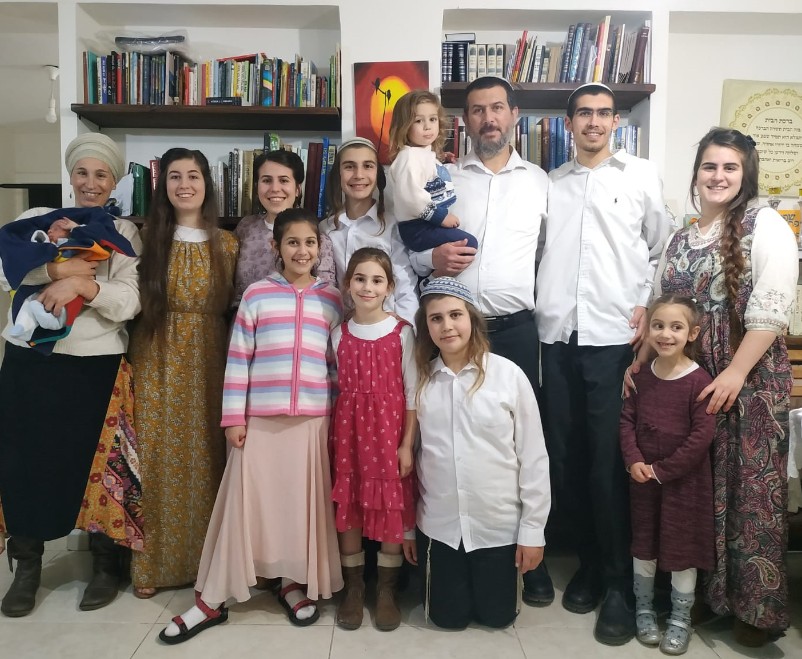
"We Do Not Know How or From Whom We Were Infected"
Despite the sophisticated tracking and cellular tracking done by the security system to monitor the map of infection in Israel, even now, a month later, it is still unclear who infected the Ben Ezra family. "Was it me or my husband, or the two girls in national service, or the boy from the yeshiva? We do not know. Any one of the four of us could have brought the virus, possibly during a trip on the road, but aside from guesses, we know nothing.
"A week and a half after Purim, we learned that the coronavirus had arrived in our home, in full force," recounts Ben Ezra. "At first, my husband and daughter didn't feel well. It didn't seem serious; they felt mild pains and had a fever. We thought it was a mild flu, but because I was pregnant, I decided not to take any risks. After consulting with our family doctor, we contacted Magen David Adom and asked for coronavirus tests. Shortly after, they came to our home, took tests, and the results showed that my husband and daughter had contracted the virus. Then, the rest of the family was tested, and it turned out we were all sick. *Baruch Hashem*, we hardly felt it, except for my husband and daughter, who felt slight pain for a short time; the rest of the family experienced it as something particularly mild, like the temporary loss of taste and smell. Besides that, the virus was not present in our daily lives, except, of course, for the restriction of leaving the house that we had to deal with.
"Coronavirus was met with a lot of humor in our family," Hagit continues, "we took it in good spirits. That doesn't mean there was no fear; we were a bit anxious, after all, it is a virus that some of those infected with it might find themselves in serious conditions, *lo aleinu*, but for us, it can be said there was almost no fear. The children got through it very easily; the only one slightly anxious was me, concerned for the baby's fate. I was somewhat relieved after doctors explained that the virus should not harm the baby. However, I still hoped to recover by the time of delivery since the delivery procedure is much more complicated for coronavirus patients. That hope did not materialize, because unlike previous births where I gave birth late, this time I gave birth early."
In what ways was this birth different from previous ones?
"Almost everything. First of all, I had to go to the hospital alone, and the fact that my husband couldn't be with me was a difficulty in itself. Before leaving for the hospital, I called the maternity ward at Poriya Hospital and informed them that I was a coronavirus patient at the beginning of labor so that they could prepare. I left for the hospital and called again to update them before I arrived. The hospital staff was well-prepared. When I arrived, everything was ready, and the staff was waiting for me.
"It certainly wasn’t a regular birth. They put me in a small room, and the midwife was with me. For eight consecutive hours, we stayed together in the room the whole time, with the midwife not leaving at all. One can easily imagine the uncomfortable feeling. Luckily, the midwife was very special. She gave me the best feeling, as if she was glad and felt great about the challenging role she had taken upon herself. Eight hours later, I had a healthy son, *mazal tov*."
Immediately after the birth, Hagit wanted to stay at the hospital, but soon realized that for both her and the baby, it was best to leave. "After the delivery, I was moved to an adjacent room where I was alone with the child. Since I had no symptoms, the medical staff did not want to put me in a room with other coronavirus patients. I was left alone, without a shower and basic conditions. About a day after giving birth, I realized it wouldn't be wise to stay at the hospital and informed them that I was leaving.
"I want to highlight the excellent care we received at the hospital. Both from the nurses, who treated me amazingly, and even when they left, they would tell me how bad they felt about leaving me alone. Also, in how they managed when I left the hospital, after being exceptionally allowed to leave with all the equipment used by the child, since my husband couldn’t come to bring clothes and replacement equipment."
So how did you manage to have the equipment?
"Leaving the hospital was with the assistance of the Nof Hagalil municipality, which sent a special ambulance to take me home two hours before the start of Shabbat. About a day and a half after leaving the house, I returned home with the child in hand. When I arrived, I found the house well-organized and a disinfected and tidy room waiting for me and the baby, courtesy of my dear children.
"This complexity of taking care of a small baby during an infectious disease period continued even after I returned home. For example, when the baby developed jaundice, the health fund was hesitant to come and examine him, but there was someone who helped us, and eventually, they came and checked the baby."
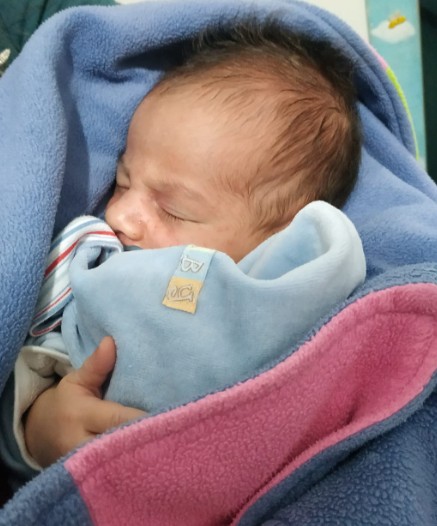
Watching the Baby Through the Window
"From then on, family members embarked on a mission to protect the little baby from contracting the virus. "As part of the effort to keep him safe, I was the only one to touch him. When I took care and held him, I made sure to wear a mask and gloves. My children were very hurt by the fact that they couldn’t approach him and hold the baby they had been so eagerly waiting for, but the goal was worth it to them. The most we could do was show the baby to the children, and even this, we did through a glass window. Fortunately, we have a private yard; the children stood in the yard, and I held the baby close to the window, so they could see him. It sounds surreal, but it was the reality we dealt with. We wanted to prevent the baby from exposure to the virus, even though we heard it’s not dangerous for children, contracting any virus, certainly when it's a baby's first few moments in life, shouldn’t ever be a good thing."
The protection of the child was quite strict. For example, during the Passover Seder, the baby was brought to the holiday table almost entirely covered with a diaper. This diligence paid off, and the baby did not become infected, even though nearly all other family members were sick at the time.
How did you cope with this reality?
"I was very anxious that the child wouldn’t get infected and was willing to pay the price for it, but it was definitely hard because I had to care for the child alone, without any help. I returned home just four days before the Passover Seder. The children managed to organize the whole house, they simply did everything without putting pressure on me or involving me too much in matters, and at least that eased the situation for me.
"Luckily our neighbors, members of the religious core we belong to, helped us. Their enlistment for our sake was amazing. Since we couldn’t leave the house, we completely relied on groceries neighbors and acquaintances bought for us. I constantly received phone calls from neighbors and friends living in my area, offering to purchase products for us from the supermarket. Also, food was sent to us by the neighbors. For example, one Shabbat, I heard knocks on the door; when I opened it, I found baked cookies by the door, and at the edge of the yard stood my neighbor, who just wanted to wish *mazal tov* and give what she could. All the help and support came with warmth and love."
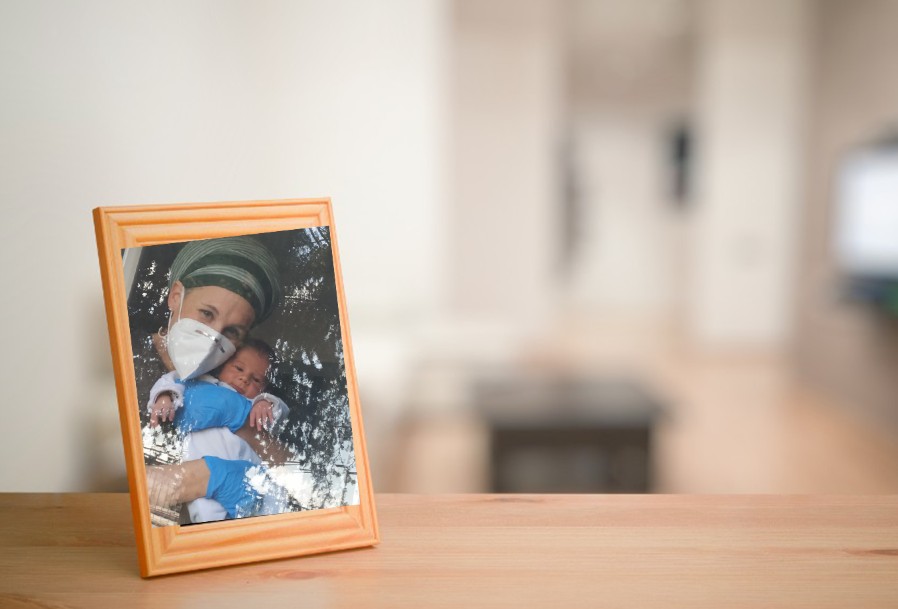
"People Are Afraid When They Hear I Was Sick"
However, not everything went smoothly. Hagit also encountered more complex events from people who reacted inappropriately in various situations. "There was a case with one neighbor who shouted at our children when they went out to play in our yard, telling them to go back inside to avoid infecting the neighbors. It wasn’t pleasant. Another incident occurred during Passover; they held a balcony minyan here. My husband and sons went out to our private yard to join the prayer. One neighbor heard our family name being called, and quickly wrote on social media about a coronavirus-infected neighbor who went outside her home and could infect the whole neighborhood. I responded that it wasn't true and that we are very careful not to infect anyone. There was another time when we were sitting in our yard eating, and one of our neighbors called the police, claiming we were violating quarantine, even though we were allowed to be in our private yard. In this regard, I want to emphasize that our adherence to the rules throughout was particularly strict, and this ensured that no one around us was infected. It's also important to know that coronavirus patients who have recovered are like everyone else, and there’s no need to shy away from them, though some people still do post-recovery. This hesitation isn’t something we encounter almost anywhere, but there are some who are like that."
During this period, the Ben Ezra family feared the circumcision of the newborn would be held under restrictions and difficulties. "Luckily, we recovered before the circumcision, so at least this ceremony was conducted more comfortably. Up until then, we had quite a few tests," Hagit says. "There were good people who helped us and expedited things for us, so that as soon as possible, examiners arrived. The test to rule out the coronavirus isn’t pleasant, but we also received it with humor.
"We underwent four or five tests, until we began receiving negative answers. According to the Ministry of Health’s protocols, after two negative tests, the person is considered disease-free. About a week and a half ago, we all received two negative answers, and finally, we could stop relying on acquaintances' help. Overall, the first time we went outside after the long period gave us strength."
Intimate Circumcision
The circumcision ceremony was different but emotional. For safety reasons, the circumcision took place outside the home. "There is such a claim that the virus stays in the home for about two weeks," explains Hagit, "so due to fear of infection of the mohel and other guests, we decided to have the ceremony in the yard. Also, there weren’t many guests; as expected, my parents and mother-in-law came, alongside a few neighbors and friends who came to complete a *minyan*. The rest watched the event via Zoom. The guests gathered on the adjacent sidewalk.
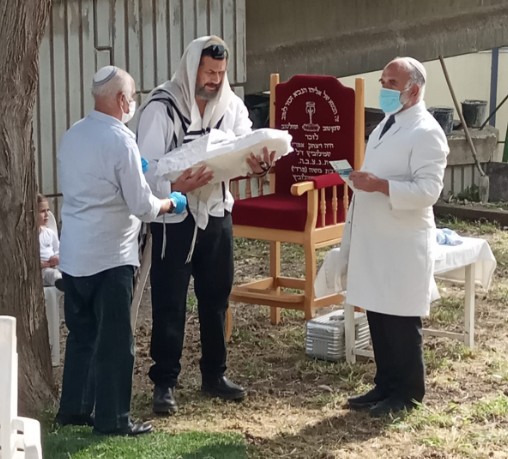
"Ultimately, this circumcision was one of the happiest we’ve ever held. There was something beautiful about the intimacy, which was also expressed in the meal we had alone after the circumcision at our home. We were very happy to see my parents and my husband’s parents after not seeing them for a long time."
Your family faced considerable challenges,no doubt you’ve gone through many experiences during this time,what is your message to the people of Israel?
"It was a difficult time on the one hand. But what helped us get through this period was the support we received from everyone who surrounded us, both from our community members in the religious core, the municipality, and even the police. During this challenge, I discovered the beautiful side of the police: throughout the period, officers would call to ensure we had everything we needed. The calls to make sure we were following the isolation guidelines were made pleasantly and in a considerate and thoughtful manner. All this once again proves that there is no nation like Israel in terms of mutual responsibility.
This period also taught me another important message that I want to share with the people of Israel: I have always been the strong person who assists and supports others. This time, it was me who needed help from others. And it's okay to accept help from others, even if you are usually on the giving end."

